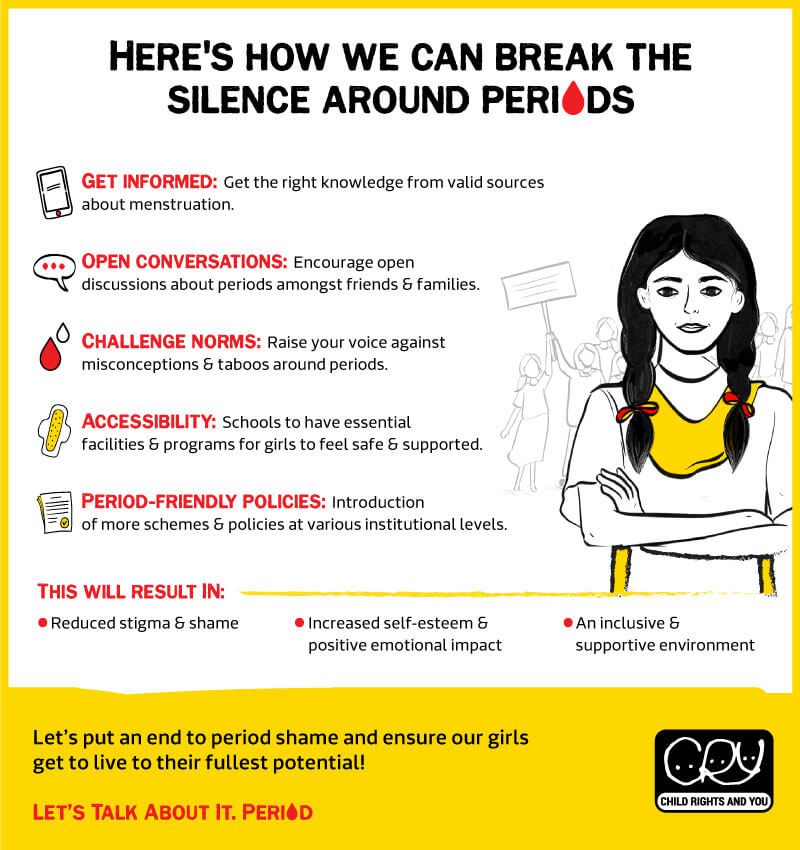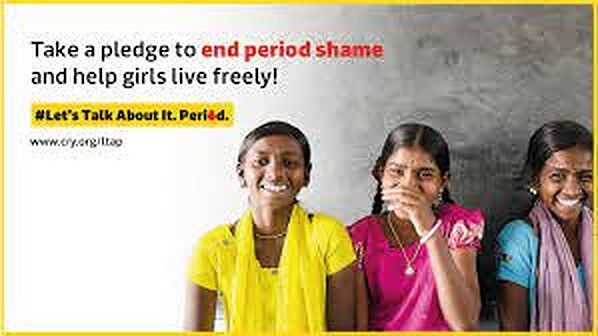Reading Time: 3 minutes
A press release by CRY launching a pan-India campaign to demystify taboos on menstruation.
Just think about it – a time when ISRO, in a mission to celebrate ‘Azadi ka Amrit Mahotsav’, sends a satellite built by 750 girls from across the nation, many of our adolescent girls still miss out on school during their periods and even hesitate to talk openly about menstrual health and hygiene!
A quick look at the existing data suggests that more than half (52 per cent) of adolescent girls are unaware of menstruation until they get it themselves. One out of every four girls between 15-19 years do not practice proper menstrual hygiene.
https://www.ncbi.nlm.nih.gov/pmc/articles/PMC4785312/pdf/bmjopen-2015-010290.pdf
In a society where girls equally participate with their male counterparts in almost every sphere of life and work, discrimination against menstruating young women is still rampant in India, with periods having been considered taboo and associated with impurity. So much so that since puberty sets in, girls are socially programmed to live with the pain and fear and are seldom allowed to seek help when in acute physical or mental discomfort due to periods – thanks to the aura of embarrassment that shrouds the topic.
To bust this narrative, to shun the culture of silence and help young girls fight ‘Period Shaming’, CRY – Child Rights and You has launched a pan-India campaign #Let’s Talk About It! Period! – to address taboos around periods and help them understand menstruation better so that they do not feel ashamed or embarrassed of bleeding, a natural physiological phenomenon.
Elaborating on the objective of the campaign, Puja Marwaha, CRO, CRY, said, “Through this initiative, we aim to encourage adolescent girls to openly talk about periods as a normal body function instead of a topic that incites shame and embarrassment; address myths and taboos related to menstruation and shed light on the facts, and inspire a circle of support for adolescent girls including their family
members, male peers, teachers and community allies.”
“Historically, the culture of silence and the social stigma attached to periods have been fueled by the patriarchal narrative deeply ingrained in our culture and social norms and is fed by girls’ lack of knowledge around menstruation. It is crucial to demystify myths and raise awareness of menstruation to help young girls, especially in underprivileged communities, break away from the age-old
shackles of period shaming so that they can solely focus on taking care of their health, access menstrual hygiene with freedom and live with dignity, Puja said.
“Menstrual health and hygiene are integral to adolescent girls’ health. CRY has extensively worked with various stakeholders on Menstrual Health and Hygiene (MHM) for the last decade and has also published Life Skills modules focusing on the same. This campaign is an organic extension of our strong focus on addressing various issues that pull back young girls and women from accessing MHM,” she added.
Though the primary target group of the three-month-long campaign are girls within the age group of 10-17 years, the secondary audience includes adolescent boys, family members and community members. The campaign will culminate on International Girl Child Day (11 October 2022).

As part of the campaign, CRY would also conduct a survey among girls within its intervention areas – to assess their levels of understanding, knowledge, attitude, and practice when it comes to managing menstrual health and hygiene and to evaluate the myths, misconceptions and restrictions practised by girls during menstruation. The survey will be conducted among 4000+ respondents across the rural and urban intervention areas in eight states, namely West Bengal, Assam, Uttar Pradesh, Madhya Pradesh, Tamil Nadu, Andhra Pradesh, Maharashtra and Chhattisgarh.
The campaign aims to have a 360-degree communication approach, with clear-cut messaging across social media and offline platforms, thus highlighting gaps and celebrating the champions leading the battle to bust the myths and social taboos related to periods.
The campaign further aims to build the capacity of all concerned stakeholders on the adolescent hygiene and management of MHH. Other advocacy initiatives under the campaign will include:
Incorporating/Institutionalising components related to best practices of adolescent health and hygiene into monthly VHSNDs, and developing an in-depth understanding of the gaps for larger advocacy
Advocacy at the Panchayat (in the rural contexts) and Ward (in the urban setups) levels towards ensuring the functionality of toilets and availability of water
Advocacy with the concerned stakeholders (e.g. the Department of Health and others) towards free distribution and seamless access to sanitary products at the state and the union level and raising voices for adequate public provisioning.
To know more about the campaign and to sign the pledge, please visit: https://www.cry.org/lets-talk-about-periods/?utm_source=social&utm_content=period-shame-sm
Pictures from CRY













